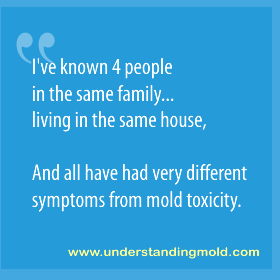To everyone else, you look fine. You might be paler than normal, gaining or losing weight, and starting to show other signs of being sick. But to everyone else, you look normal. When you complain that you don’t feel great, they may tell you, “Oh, you just need to get outside more.” or “You just need to get more exercise.” For awhile, you may just think you are stressed out and wonder why your stamina won’t come back after a little rest.
But really, you feel bad…just not right…and you may not even have specific symptoms that you feel like you can go to the doctor with.
 Mold toxicity (Sick Building Syndrome (SBS) as named by the World Health Organisation) can end up really ravaging your body. Your symptoms can range from mild allergy-like symptoms to severe. And, everyone…even those living in the same house or working in the same building can be affected differently.
Mold toxicity (Sick Building Syndrome (SBS) as named by the World Health Organisation) can end up really ravaging your body. Your symptoms can range from mild allergy-like symptoms to severe. And, everyone…even those living in the same house or working in the same building can be affected differently.
Exposure to high levels of indoor mold can cause injury to and dysfunction of multiple organs and systems, including respiratory, hematological, immunological, and neurological systems, in immunocompetent humans.
It’s the Mycotoxins
Many people immediately think, “Oh, I’m not allergic to mold!.” So while allergy-type symptoms may increase when you are exposed to a lot of mold, there is another reason mold can make you sick.
When mold is trapped in indoor environments, it feels like it is being attacked and tries to protect itself. So it produces mycotoxins that are both toxic and damaging to the human body. What’s even worse, you can’t see or smell mycotoxins, and all the while, they are making your home a hostile environment to your health.
So, if mold illness was an allergy problem, it would make it much simpler to treat and deal with. But, it is an issue of your body being so full of toxins that it can’t function properly anymore. Let’s put it this way…you are being poisoned by your environment.
Symptoms
If you have more than a couple of these symptoms and there has been mold or water damage in any of your environments (E.g. home, work, school), you may want to talk to a mold illness experienced doctor.
Skin Skin sensitivity Itching Bruising
Mouth Receding gums Sensitive to hot/cold
Neurological Vision problems1 Decrease in hearing Numbness/tingling1 Dizziness1 Tremors1
Mood Anxiety1 Depression1 Irritability1
Pain Headache1 Migraines Aching joints1 Muscle pain1
General Fatigue1 Chronic Fatigue2 Insomnia1 Laryngitis1 Fibromyalgia1, 2 Vasculitis1 Angioedema1 Hair loss Adrenal/thyroid issues Nosebleeds
______________
REFERENCES
1. Curtis, Luke, M.S.; CIH, Lieberman, Allan, M.D.; Stark, Martha, M.D.; Rea, William, M.D.; and Vetter, Marsha, M.D., Ph.D. Adverse health Effects of Indoor Molds in Journal of Nutritional and Environmental Medicine (September 2004, 14 (3), 1-14
2. Brewer, J.H., Thrasher, J.D., Straus, D.C., Madison, R.A., Hooper, D. Detection of mycotoxins in patients with chronic fatigue. Toxins (Basel). 2013 Apr 11; 5 (4):605-17. Read the reference article


